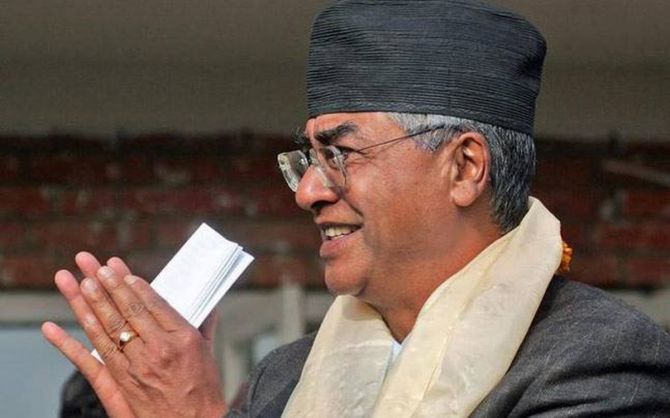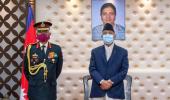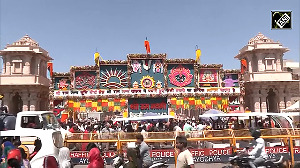Sher Bahadur Deuba on Tuesday formally became Nepal's Prime Minister for a record fifth time after the Supreme Court's intervention and last-minute hiccups over his appointment letter.

The 75-year-old veteran politician and Nepali Congress President took the oath of office and secrecy from President Bidya Devi Bhandari during a swearing-in ceremony which was delayed by over two hours.
The ceremony, initially set to be held at 6.00 pm (17.45 IST), took place around 8.15 pm after the President's Office issued a fresh appointment notice.
The oath ceremony was delayed after the Nepali Congress party took exception to the Office of the President's statement that did not mention the constitutional provision under which Deuba was appointed the prime minister.
A five-member Constitutional Bench led by Chief Justice Cholendra Shumsher Rana, in its order on Monday, had said that Deuba must be appointed the Prime Minister in line with Article 76 (5) of the Constitution.
As per Article 76 (5), any member of the House of Representatives who presents a ground on which she/he can garner a vote of confidence in the House gets appointed as a prime minister.
With Deuba insisting on a fresh appointment notice, President Bhandari agreed to his condition and appointed him under Article 76 (5) of the Constitution, resolving the last-minute hitch.
Deuba's appointment ends K P Sharma Oli's three-and-a-half-year-long and eventful tenure as prime minister.
Four new ministers -- two each from Nepali Congress (NC) and Communist Party of Nepal-Maoist Centre -- also took oath of office as part of Deuba's small Cabinet.
NC's Balkrishna Khand and Gyanendra Bahadur Karki were sworn-in as Home Minister and Minister for Law and Parliamentary Affairs, respectively.
Pampha Bhusal and Janardan Sharma from Maoist Centre have been appointed Minister for Energy and Minister for Finance, respectively.
Chief Justice Rana, CPN-Maoist Centre chairman Pushpa Kamal Dahal 'Prachanda' and senior leader of Communist Party of Nepal-Unified Marxist–Leninist Madhav Kumar Nepal were also present on the occasion.
Deuba has previously served as Nepal's Prime Minister four times from June 2017-February 2018, June 2004-February 2005, July 2001-October 2002 and September 1995-March 1997.
Earlier, outgoing Prime Minister Oli accused the apex court of 'deliberately' passing the verdict in favour of the Opposition parties.
Oli, 69, claimed the majority of people still supported him but he was leaving just to implement the apex court's order.
He said the government was successful as it expedited development works across the country and made efforts to control the COVID-19 crisis.
Oli said he would like to see the country go to the general elections as soon as possible, hoping his CPN-UML would emerge victorious again.
Using his party's election symbol of the sun as a pun, Oli said clouds could hide the sun for a time being but it would soon rise again.
Deuba is required to seek a vote of confidence from the 275-member House of Representatives within 30 days of his appointment as the Prime Minister, as per the constitutional provisions.
The Supreme Court on Monday overturned Prime Minister Oli's May 21 decision to dissolve the House of Representatives and ordered the appointment of Deuba as prime minister.
It said that Oli's claim to the post of prime minister was unconstitutional.
Reinstating the House yet again -- the court had restored the House earlier on February 23 after Oli dissolved it on December 20 -- the bench ordered to make arrangements for holding the House meeting by 5 PM on July 18.
In its order, the constitutional bench said President Bhandari's decision to reject Deuba's claim to form a new government was unconstitutional.
Oli, who was heading a minority government after losing a trust vote in the House, has repeatedly defended his move to dissolve the House of Representatives, saying some leaders of his party were attempting to form a 'parallel government'.
Meanwhile, Nepal's Attorney General Ramesh Badal resigned on Tuesday.
Badal, as the legal advisor to the Nepal Government and other officials of the government, had argued against reinstatement of the House of Representatives, on which the Supreme Court had issued an interim order for its reinstatement on Monday.











 © 2025
© 2025